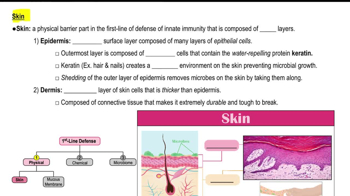The type of skin tumor that involves the keratinocytes of the stratum spinosum is:
a. Basal cell carcinoma
b. Squamous cell carcinoma
c. Malignant keratocytoma
d. Malignant melanoma
 Verified step by step guidance
Verified step by step guidance Verified video answer for a similar problem:
Verified video answer for a similar problem:



 3:19m
3:19mMaster Introduction to Layers of the Epidermis with a bite sized video explanation from Bruce Bryan
Start learning